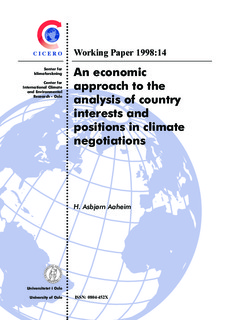| dc.description.abstract | The publication develops an approach to the appraisal of economic interests and positions in climate negotiations. The approach is based on a full-scale analysis of costs and benefits of climate treaties.
Interest is defined as the ‘best’ treaty a country can obtain, that is, the policy they would have chosen if they could dictate the treaty to the world. The position is found by a ranking of alternative proposals imposed on each country, which are different from the ’best’ treaty. The proposals are ranked according to their costs, measured in terms of consumption loss and increase in damage of climate change relative to the interest.
Some numerical illustrations for the US, EU and Japan are presented. Different from many other economic studies, the analysis indicates that the economic interests between the three countries may be substantial, and that the ranking of proposals differ. Secondly, the long-term character of climate policy leaves a considerable range of feasible solutions of the negotiations. | nb_NO |
